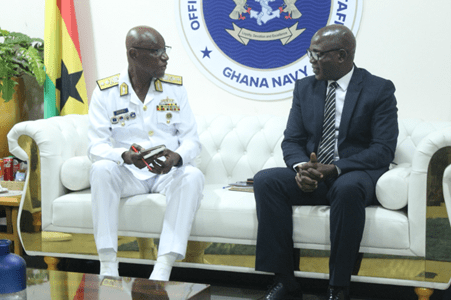In a move to reinforce Ghana’s aviation safety and emergency response systems, Acting Commissioner of the Aircraft Accident and Incident Investigation and Prevention Bureau (AIB), Mr. John M.K. Wumborti, paid a working visit to the Chief of the Naval Staff, Rear Admiral Godwin Livinus Bessing, at the Naval Headquarters in Accra.
The visit is part of the AIB’s broader stakeholder engagement strategy aimed at enhancing partnerships within Ghana’s aviation and national security sectors.
Mr. Wumborti emphasized the strategic importance of the Ghana Navy in aviation safety, particularly in search and rescue operations within maritime zones under Ghana’s jurisdiction. “The Ghana Navy remains a vital partner in ensuring the effectiveness of emergency responses over the sea,” he said.
Providing insight into the Bureau’s mandate, the Technical Adviser to the Acting Commissioner, Alhaji Saani Adams, highlighted the international nature of aviation and the necessity for cross-sector collaboration. “Aviation is inherently global, and every occurrence often involves multiple states,” he noted.
Alhaji Adams explained that under Annex 13 of the International Civil Aviation Organization (ICAO), Ghana is mandated—through the AIB—to investigate all civil aircraft accidents and incidents occurring within the Accra Flight Information Region (FIR). This responsibility, he said, is not only a national obligation but also an international commitment governed by ICAO standards.
He further pointed out that Act 1028, which established the AIB, ensures the Bureau operates independently and professionally. “A country’s ability to investigate aircraft occurrences is a key global benchmark for aviation safety. Though we are a young institution, the expectations placed on us are high, and rightly so,” he added.
Alhaji Adams stressed the Navy’s frontline role in handling aircraft occurrences over water. “In such scenarios, the Navy becomes our closest operational partner—crucial for search and rescue efforts and for securing the site.”
Rear Admiral Bessing welcomed the AIB’s outreach, describing the engagement as timely and essential. He expressed the Navy’s readiness to deepen cooperation and proposed the creation of a joint standing committee to ensure effective coordination during aviation-related maritime incidents.
The Admiral also highlighted the role of the Navy’s Maritime Operations Centres along Ghana’s coastline. While their current mandate is focused on territorial waters, he revealed plans to extend surveillance capabilities into Ghana’s Exclusive Economic Zone (EEZ) using advanced technologies.
Commander Michael Asiamah, Deputy Director of Intelligence for the Ghana Navy, echoed the call for closer integration. He recommended that AIB personnel be included in Navy simulation and emergency response exercises to strengthen joint preparedness. “Such collaboration will ensure a seamless, effective response in the event of real incidents,” he said.
As Ghana continues to strengthen its aviation safety framework, enhanced cooperation between the AIB and the Ghana Navy is expected to play a crucial role in ensuring rapid, coordinated responses to air incidents over both land and sea.


